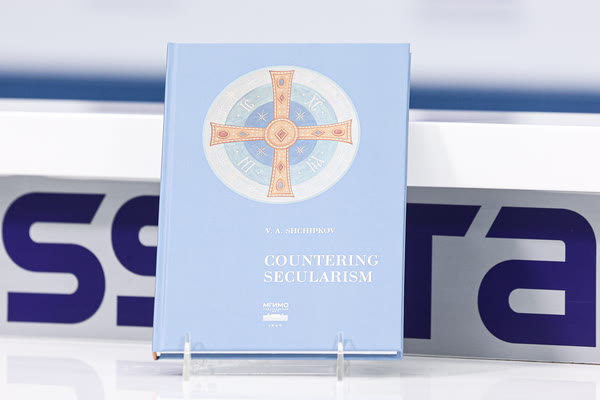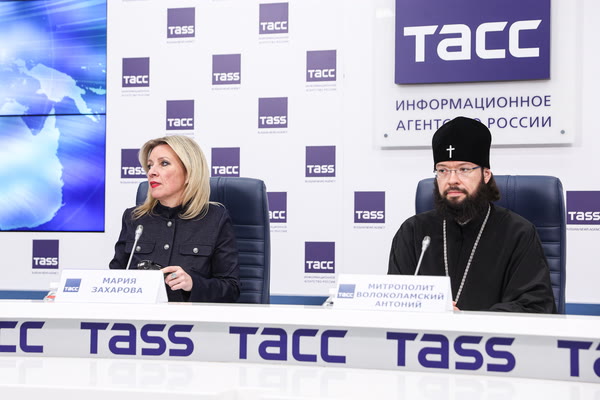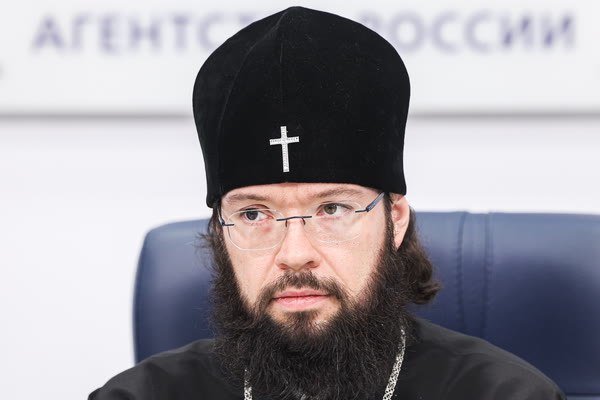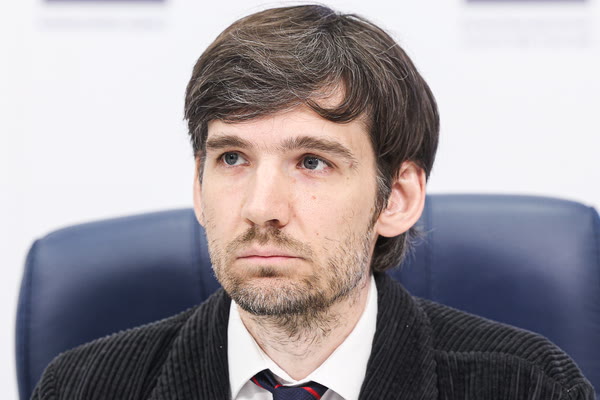
Department for External Church Relations
The site uses cookies to help show you the most up-to-date information. By continuing to use the site, you consent to the use of your Metadata and cookies. Cookie policy
English Edition of V.A. Shchipkov’s Monograph 'Countering Secularism' presented at TASS




DECR Communication Service, 02.07.2025
On July 2, 2025, the TASS Press Center in Moscow hosted a presentation of the English-language edition of "Countering Secularism", a monograph by Dr. Vasily A. Shchipkov - Director of the Russian Expert School, Associate Professor of the Department of International Journalism at MGIMO, and First Vice-Rector of St. John the Theologian Russian Orthodox University. The book is an adaptation for international readers of Shchipkov’s extensive work "Genealogy of Secular Discourse" and is dedicated to the origins of the Western secular value system, reports Patriarchia.ru.
The panel included: Metropolitan Anthony of Volokolamsk, Chairman of the Department for External Church Relations of the Moscow Patriarchate; M.V. Zakharova, official representative of the Ministry of Foreign Affairs of Russia and Director of the Department of Information and Press; and the author himself, V.A. Shchipkov. Attendees included Ambassador Extraordinary and Plenipotentiary of the Republic of Yemen A.S. Al-Bakheishi; Chargé d’Affaires of the Republic of Costa Rica in the Russian Federation R.C. Itcheberia; representatives of foreign delegations and embassies of Argentina, Bahrain, Guinea, Kuwait, Pakistan, Senegal, Eritrea, and the League of Arab States.
The presentation opened with remarks by the author, V.A. Shchipkov, who noted that the idea for the book - and its abridged version - was inspired by a thought expressed by His Holiness Patriarch Kirill of Moscow and All Rus’ in one of his speeches: that secularism is not only an ideology but also a kind of religious doctrine. The author expressed his gratitude to Metropolitan Anthony, M.V. Zakharova, and L.E. Slutsky, Chairman of the State Duma Committee on International Affairs, for their contributions, including the writing of the book's foreword.
Shchipkov noted that the worldview we inhabit is a way of thinking. In this sense, the Western world order is a way of thinking about the world rooted in secular philosophy. “The territorial colonialism of Western countries is inseparable fr om cultural colonialism - restricting the sovereignty of other peoples in values, identity, sometimes in faith, and in ways of thinking that are natural and convenient to them. To combat territorial colonialism, one needs an army, a growing economy, and media independent from foreign influence. Liberation from such colonial dependence is a struggle for freedom, and its success is measured in the restoration of unity - of thought between the government and the people. Such unity leads to the gradual reclamation of sovereignty by the people in all areas of life, from territory to the educational system,” Shchipkov emphasized.
He further stressed that this process has been ongoing in Russia for the past quarter-century. “The main thesis of "Countering Secularism" is that in order to resist cultural colonialism, it is not enough to reclaim these external spheres of life - we must also change our way of thinking. We must break the habit of aligning our thoughts and speech with so-called internationally 'accepted' standards, whose core lies in Western secular culture. For Russia, this cultural decolonization means acknowledging that global secular culture is not organic or native to us. For centuries, this culture has gradually pulled Russia in - as a satellite, as a colony. The secularism studied in this work is a kind of ideology of the Western globalist elites, which hijacks the ancient energy of Christian universalism to serve entirely un-Christian goals and values. And the cultures and peoples that remain within this movement risk perishing,” Shchipkov said.
In his view, the advantage of Russian culture lies in the fact that “it has no deeply rooted genetic ties with this ideology, and so it is relatively easy for us to stop depending on it. That is precisely what happens during the most critical turning points in Russian history,” Shchipkov concluded.
Metropolitan Anthony of Volokolamsk noted that the first presentation of "Genealogy of Secular Discourse" took place on November 11, 2024, at the Department for External Church Relations. It was at that event that the idea arose to translate Shchipkov’s study into foreign languages. “I believe the theme explored in this study is extremely relevant, including for us at the DECR, since in dialogue with representatives of other Christian confessions and world religions, despite our differences, we primarily seek common ground. One such point of contact - wh ere we strive to work together - is in resisting the growing secularization of our society and all the challenges that come with it. I am confident that such a systematic study of the origins of secular thought will help us - just like any knowledge of the past - to soberly assess the present and look toward the future. This work will be extremely useful to anyone concerned with the future of Christian civilization,” said Metropolitan Anthony.
M.V. Zakharova noted that the English edition of "Countering Secularism" was first announced at the St. Petersburg International Economic Forum. “The appearance of such a study symbolizes a return to our ideological roots - a path home,” said the official representative of the Russian Foreign Ministry.
“Paradoxically, the secular paradigm was also founded on faith - but a different kind of faith: faith in the autonomy of reason, faith in progress detached from spirituality, faith in a certain kind of individual freedom that, as all-encompassing and absolute, is to be placed on a pedestal - faith in the form of a cult. Today we are witnessing the results of this process, of all these tenets, and in response to the overall civilizational crisis of existential meaning, more and more people are seeking true answers - turning to tradition, to faith, to their roots, to look there for solutions to today’s questions. This return is the very theme of Vasily Shchipkov’s book,” emphasized M.V. Zakharova.
The presentation concluded with the author and other participants taking questions from the audience.
Photos: TASS
Patriarch
Department Chairman
Sermons
05.01.2026
24.12.2025
24.01.2021
06.11.2020